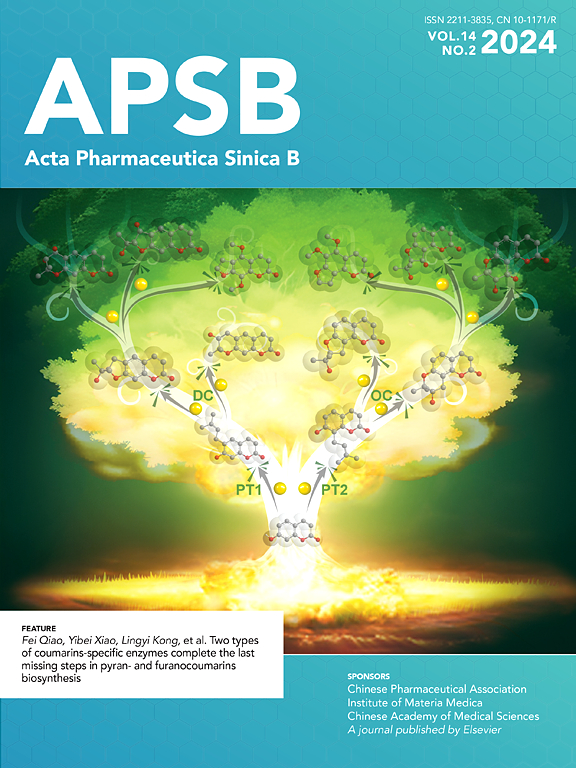抑制cct5介导的天冬酰胺生物合成和抗pd - l1在结直肠癌中产生协同抗肿瘤作用
IF 14.7
1区 医学
Q1 PHARMACOLOGY & PHARMACY
引用次数: 0
摘要
异常的氨基酸代谢通过诱导肿瘤细胞的恶性行为和改变肿瘤微环境内的免疫景观来促进肿瘤进展。然而,潜在的机制仍不清楚。在这项研究中,我们构建了结直肠癌(CRC)类器官和患者源性肿瘤异种移植(PDX)模型,进行了多方面的验证,以证实t复合物蛋白1亚基epsilon (CCT5)介导天冬氨酸的生物合成并增强抗pd - l1免疫治疗的敏感性。机制上,CCT5直接结合天冬酰胺合成酶(ASNS),促进天冬氨酸(Asn)的合成。Asn-mTORC1轴促进肿瘤细胞增殖,同时上调PD-L1表达,导致效应CD8+ T细胞数量减少。l-天冬酰胺酶(ASNase)联合抗pd - l1治疗可有效逆转以CCT5高表达为特征的结直肠癌的生长。总之,我们确定CCT5是一个潜在的生物标志物,可以指导ASNase和抗pd - l1抗体在结直肠癌治疗中的联合使用。本文章由计算机程序翻译,如有差异,请以英文原文为准。
Inhibition of CCT5-mediated asparagine biosynthesis and anti-PD-L1 produce synergistic antitumor effects in colorectal cancer
Abnormal amino acid metabolism promotes tumor progression by inducing malignant behaviors in tumor cells and altering the immune landscape within the tumor microenvironment. However, the underlying mechanisms remain unclear. In this study, we constructed colorectal cancer (CRC) organoids and patient-derived tumor xenograft (PDX) models, performing multifaceted validation to confirm that T-complex protein 1 subunit epsilon (CCT5), mediates the biosynthesis of aspartate and enhances sensitivity to anti-PD-L1 immunotherapy. Mechanistically, CCT5 directly binds to asparagine synthetase (ASNS) and promotes the synthesis of aspartate (Asn). The Asn–mTORC1 axis facilitates tumor cell proliferation while upregulating PD-L1 expression, which leads to a reduction in the number of effector CD8+ T cells. Treatment with l-asparaginase (ASNase) combined with anti-PD-L1 therapy effectively reverses the growth of CRC characterized by high CCT5 expression. In summary, we identify CCT5 as a potential biomarker to guide the combined use of ASNase and anti-PD-L1 antibodies in CRC treatment.
求助全文
通过发布文献求助,成功后即可免费获取论文全文。
去求助
来源期刊

Acta Pharmaceutica Sinica. B
Pharmacology, Toxicology and Pharmaceutics-General Pharmacology, Toxicology and Pharmaceutics
CiteScore
22.40
自引率
5.50%
发文量
1051
审稿时长
19 weeks
期刊介绍:
The Journal of the Institute of Materia Medica, Chinese Academy of Medical Sciences, and the Chinese Pharmaceutical Association oversees the peer review process for Acta Pharmaceutica Sinica. B (APSB).
Published monthly in English, APSB is dedicated to disseminating significant original research articles, rapid communications, and high-quality reviews that highlight recent advances across various pharmaceutical sciences domains. These encompass pharmacology, pharmaceutics, medicinal chemistry, natural products, pharmacognosy, pharmaceutical analysis, and pharmacokinetics.
A part of the Acta Pharmaceutica Sinica series, established in 1953 and indexed in prominent databases like Chemical Abstracts, Index Medicus, SciFinder Scholar, Biological Abstracts, International Pharmaceutical Abstracts, Cambridge Scientific Abstracts, and Current Bibliography on Science and Technology, APSB is sponsored by the Institute of Materia Medica, Chinese Academy of Medical Sciences, and the Chinese Pharmaceutical Association. Its production and hosting are facilitated by Elsevier B.V. This collaborative effort ensures APSB's commitment to delivering valuable contributions to the pharmaceutical sciences community.
 求助内容:
求助内容: 应助结果提醒方式:
应助结果提醒方式:


